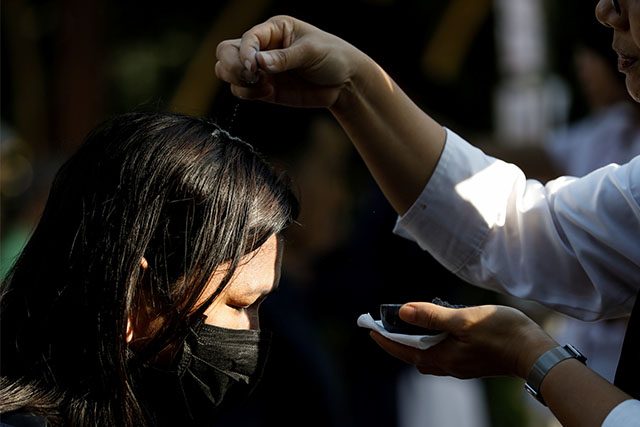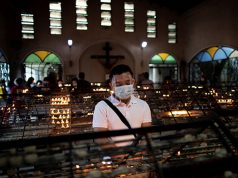
Sprinkling ashes on the head might be unusual but it is one of the ways in which the Catholic Church is employing preventive measures amid the 2019 novel coronavirus outbreak.
For Ash Wednesday, priests and lay ministers are not drawing a cross on the foreheads of parishioners as suggested by the Catholic Bishops’ Conference of the Philippines.
Instead, the ashes are sprinkled on the crown of the head in order to avoid body contact.
The CBCP said the practice is not an innovation but an “ancient” tradition done by the church to “signify our repentance from sin, which has marred the grace of baptism,” according to CBCP president Archbishop Romulo Valles.
Ash Wednesday marks the start of the Lenten Season where Christians observe a 40-day fasting and abstinence in memorial of Jesus Christ’s fasting before he began his public ministry.
Nowadays, the Church usually venerates Ash Wednesday by marking the foreheads of parishioners with the sign of the cross.
Due to the outbreak of COVID-19, however, the practice is temporarily suspended as a form of preventive measure in consideration of the extremely communicable nature of the viral disease.
The CBCP also advised parishioners to refrain from kissing and touching the cross during the Celebration of the Passion of the Lord on Good Friday.
The public is instead recommended to genuflect or make a profound bow before the cross or the tabernacle.
Last month, the episcopal conference issued guidelines for the faithful which included completely receiving the Holy Communion by hand, avoiding hand-holding in the “Our Father” and shaking hands or kissing in the Sign of Peace.
Caloocan Bishop Pablo Virgilio David, vice president of CBCP, also recommended that churches should temporarily refrain from putting up holy water fonts where parishioners dip their fingers.
Churches are also urged to install protective cloth on the grills of confessional booths.
Highly communicable
The new coronavirus strain, officially called the severe acute respiratory syndrome coronavirus 2 or SARS-CoV-2, has been gripping the world with fear and anxiety due to its extremely communicable nature.
Experts believe that it is “more contagious than seasonal flu and potentially even more contagious than SARS,” as reported by Vox, an explanatory news website.
“How quickly a virus spreads is not linked to how sick it can make people. Though COVID-19 may spread more easily than SARS, it is not as deadly,” Tarik Jašarević, the spokesperson of the World Health Organization, said.
“That said, it still has the potential to make many people sick and to kill some, and thus containing or managing its impact are global priorities,” he added.
The COVID-19 has a high transmission rate among humans and it is known to spread through droplets from coughs and sneezes of an infected person.
“When these virus-laden droplets from an infected person reach the nose, eyes, or mouth of another, they can transmit the disease,” Vox reports.
Harvard University epidemiologist Marc Lipsitch recently predicted that the virus will infect around 40 to 70 percent of people around the world, although not everyone will have severe illnesses.
WHO has recommended everyone to practice social distancing to prevent the risk of acquiring and spreading the virus, among others.
Individuals are advised to “maintain at least a meter (three feet) distance” between themselves and a person who is coughing or sneezing, especially when the latter is not wearing a face mask.
Events drawing large crowds such as concerts, open-house festivals and international meet-ups have specifically been canceled or rescheduled due to the novel coronavirus.









